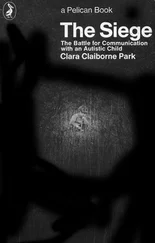Clara Park - Exiting Nirvana
Здесь есть возможность читать онлайн «Clara Park - Exiting Nirvana» весь текст электронной книги совершенно бесплатно (целиком полную версию без сокращений). В некоторых случаях можно слушать аудио, скачать через торрент в формате fb2 и присутствует краткое содержание. ISBN: , Жанр: Психология, на английском языке. Описание произведения, (предисловие) а так же отзывы посетителей доступны на портале библиотеки ЛибКат.
- Название:Exiting Nirvana
- Автор:
- Жанр:
- Год:неизвестен
- ISBN:0-316-69117-8
- Рейтинг книги:4 / 5. Голосов: 1
-
Избранное:Добавить в избранное
- Отзывы:
-
Ваша оценка:
- 80
- 1
- 2
- 3
- 4
- 5
Exiting Nirvana: краткое содержание, описание и аннотация
Предлагаем к чтению аннотацию, описание, краткое содержание или предисловие (зависит от того, что написал сам автор книги «Exiting Nirvana»). Если вы не нашли необходимую информацию о книге — напишите в комментариях, мы постараемся отыскать её.
All illustrations are by Jessy Park.
Exiting Nirvana — читать онлайн бесплатно полную книгу (весь текст) целиком
Ниже представлен текст книги, разбитый по страницам. Система сохранения места последней прочитанной страницы, позволяет с удобством читать онлайн бесплатно книгу «Exiting Nirvana», без необходимости каждый раз заново искать на чём Вы остановились. Поставьте закладку, и сможете в любой момент перейти на страницу, на которой закончили чтение.
Интервал:
Закладка:
Colors were easy. Numbers, even arithmetical processes, were easy. They were there in her head already, waiting for names. The year she turned nine we sat together as I filled sheet after sheet with rows of renditions of valentine heart-candies, things she knew and liked. They could be counted, grouped in twos, threes. fives. nines. which could themselves be grouped: three groups of nine heart-candies clearly made twenty-seven. Or I drew circles and divided them into halves, thirds, fourths, fifths — fractions! Or I added pentagons and hexagons to the triangles and squares she’d recognized before she was three. With her still rudimentary speech she asked for the series to continue: «Seven sides? Eight sides?» Heptagon, octagon, dodecagon — she learned those words as soon as I spoke them. We could share attention when I entered her world, an abstract world of order, repetition, all that represented intelligibility, security, in the bewilderment of talk she could not understand, body language she could not read, social clues she could not interpret. Two years later she would spend hour upon hour in solitary, not to say compulsive, multiplying and dividing. We watched her cover sheet after sheet with divisions by 7, 11, 13, 17, 19, identifying primes and prime factors, happy in a world of number.
Jessy still retains her capacity for autistic delight. What makes her happy today? Once she’d exult over her discovery that «70003 is a. prime!» Then numbers became what she calls «too good», so good that she would speak them only in whispers, or refuse to say them at all. Then her interest subsided; other things evoked her secret smile. Stars. Rainbows. Clouds. Weather phenomena. Quartz heaters. Odometers. Streetlamps. A strange procession of obsessions, for a year or two eliciting an intensity of emotion approaching ecstasy, then subsiding into mere pleasure. Wordless once, now a word, a phrase, could thrill her. «Asteroid explosion», «digital fluorescent number change». Recently it’s anything to do with banks, checks, above all, fees. «There’s a fee in feeling! And feet!» We know that special smile, that faraway gaze. But don’t, don’t ask her, «Why are you smiling?» The phrase itself (and there are others) invites desolation, the banshee wail; we don’t know why. Was she punished at school for daydreaming? Does she resent the invasion of her secret world? She won’t say. Could she if she would?
What’s an obsession in psychiatry becomes in art the exploration of a theme. We encourage her to paint these sources of delight. They make her painting not a task but a pleasure, and infuse it with the surreality of her secret world. Though people buy her paintings, there’s one she hasn’t wanted to sell. It’s up in her room, a rendition, in lovely pastels, of the two best things in all of New York City, marvelously come together in the atrium of the World Financial Center: the Merrill Lynch bull and the logo of Godiva chocolates. Though her own script is that of an unusually neat third-grader, the elegant lettering is perfectly reproduced, with her unerring hand and eye. Godiva, Merrill Lynch. The very words make her smile.
We encourage her obsessions in paintings, but we must limit them in daily life. Fascinated at first, people can enjoy just so much conversation about fees, and they may actively object if Jessy scrutinizes their bank statements. We have made sacrifices for the precious ordinariness of habilitation. Would Jessy’s mathematical obsession, properly nurtured, have made her into a computer whiz? I doubt it. Her calculations led nowhere; she was interested in doing them, repeating them, contemplating them, not in using them. Her math is now limited to her bank book and her tax forms, her division of the weekly grocery bill, her unerring memory for the mailbox numbers of students who graduated years ago. Numbers, once so absorbing, have gone to join her spot. So have the «little imitation people». (Long ago, when we looked at the illustrated Gulliver’s Travels, «Lilliputian» must have sounded like that to her.) Once they peopled the appliances, a family in each. Yet are they really gone? I ask her today: Are they still around, perhaps in the office computer? She says they are, but she won’t talk about them as she used to. And she’s smiling her secret smile.
Everybody likes to be astonished. Astonishing abilities and strange preoccupations have become part of the lore of autism, though many autistic people do not have them. «Savant skills» they’re called today, our kindly vocabulary of sensitivity having jettisoned the old term «idiot savant». But «savant» has a hollow ring to the parents of a child to whom algebraic processes make more sense than the social interactions of Dick, Jane, and Sally. The challenges of daily life are less interesting to read about, and much more important. Jessy had to learn, if she could, to listen, to speak, to understand, even to read and write, all of those being part of daily life in the twentieth century. In time she did, as she learned to feed herself, to dress herself, to use the toilet, to make her bed, to perform useful tasks about the house. I do not write «make herself useful»: to do that you have to perceive the desires and emotions of others, and the achievement of joint attention was not enough to call that skill into being. But concrete skills were not difficult to acquire once she learned to imitate. The much-maligned techniques of behavior modification — rewards and more rarely penalties — eventually provided her adequate motivation. Characteristically, the reinforcers were not food or praise but numbers, a rising tally on a golf counter. Every new skill made life easier for us and richer for her, as her repertoire of activities expanded.
But the most important skills are social. Jessy’s social understanding remained, and remains, radically incomplete. Such simple lessons. «We can’t ask them to move because they were there first». The difference between irritation and hurt feelings. Making sense of people, «grasping the general significance of situations». What the autistic adult, like the autistic child, finds hardest of all.
What is it like to have a mind that picks «remembrance» out of the newspaper yet must struggle to comprehend the most ordinary vocabulary of social experience? What is it like to have to learn the myriad rules of human interaction by rote, one by one? By rote, because the criterion of «how would I feel if» is unavailable, since so much of what pleases (or distresses) her does not please others, and so little of what pleases (or distresses) others pleases her. Jessy cannot tell us. Temple Grandin, who emerged from autism to become a professor of animal science at Colorado State University, can articulate concepts unavailable to Jessy; she says being autistic is like being an anthropologist on Mars. Autism, like other biological conditions, comes in varying degrees of severity; Temple’s journey has taken her farther than Jessy’s ever will. In the course of it she has recognized the necessity of learning to live like the natives. The truest learning is reciprocal: the natives too have a lot to learn.
Part one
Talking

Chapter 2
«That is not sound»
In 1961, when we first heard of autism, Jessy was three and a half. Our doctor had suspected something wrong at twenty-two months, but hospital examination could find nothing specific. That was not surprising; few were aware of autism then, even within the medical profession. Though Kanner had named it in 1943, and described it with uncanny accuracy, it remained little known, an obscure and rare disorder. Year after year the same figures were repeated: four in ten thousand, two in ten thousand — who knew, really? Who was counting such children? How many doctors were even able to recognize the condition, to distinguish it from all the other possibilities — retardation, aphasia, even, in the early years of a speechless child, deafness? Diagnosis was even more unlikely with children who were not speechless, whose intellectual development seemed to progress normally, yet who shared the characteristic social deficits and odd preoccupations of autism — children like Temple Grandin.
Читать дальшеИнтервал:
Закладка:
Похожие книги на «Exiting Nirvana»
Представляем Вашему вниманию похожие книги на «Exiting Nirvana» списком для выбора. Мы отобрали схожую по названию и смыслу литературу в надежде предоставить читателям больше вариантов отыскать новые, интересные, ещё непрочитанные произведения.
Обсуждение, отзывы о книге «Exiting Nirvana» и просто собственные мнения читателей. Оставьте ваши комментарии, напишите, что Вы думаете о произведении, его смысле или главных героях. Укажите что конкретно понравилось, а что нет, и почему Вы так считаете.



![Майкл Азеррад - Come as you are - история Nirvana, рассказанная Куртом Кобейном и записанная Майклом Азеррадом [litres]](/books/392533/majkl-azerrad-come-as-you-are-istoriya-nirvana-ra-thumb.webp)



![Эверетт Тру - Nirvana - Правдивая история [litres]](/books/399241/everett-tru-nirvana-pravdivaya-istoriya-litres-thumb.webp)




